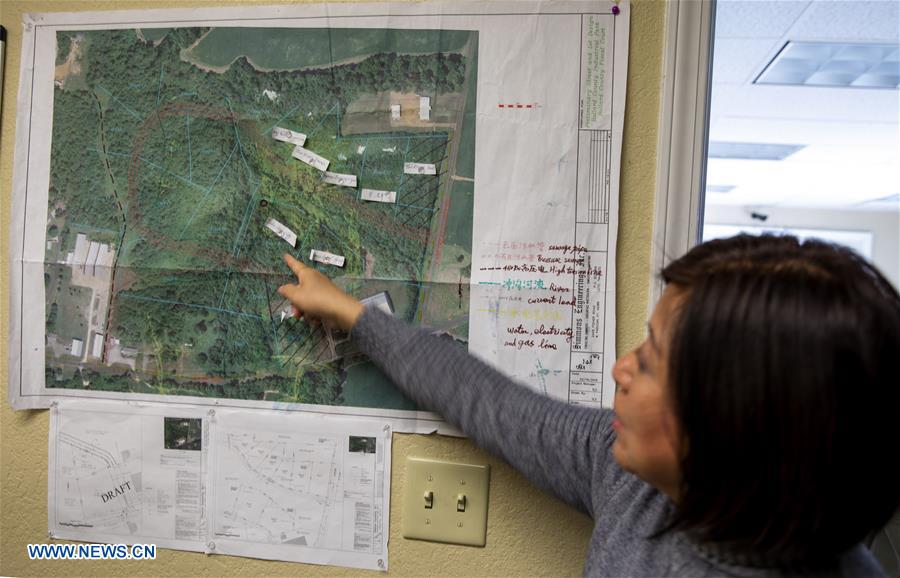
Angie Yu, an initiator of the International Fisheries Industrial Park and president of Two Rivers Fisheries, introduces the construction of the industrial park during an interview with Xinhua at her company in Ballard County, southeastern U.S. state of Kentucky, Nov. 27, 2019. (Xinhua/Wang Ying)
WICKLIFFE, the United States, Dec. 3 (Xinhua) -- For years, Todd Cooper, judge-executive of Ballard County in the southeastern U.S. state of Kentucky, has been trying to spur the local economy and increase jobs.
Compared with other local U.S. leaders, his task seems more pressing as the obscure county in the west of the Bluegrass State has long been suffering from business slack.
"We've had a downturn. We had lost jobs for 12 straight years at one point," Cooper told Xinhua in a recent interview.
The closedown of two tire manufacturing plants in the county area in the last 10 years coupled with the downsizing of the workforce in a nuclear power plant nearby had led to a loss of some 7,000 jobs in the local community, he said.
Making the situation worse is the growing problem of brain drain as the region's motivated young talents tend to leave, seeking better opportunities in urban areas, he added.
According to statistics from the Delta Regional Authority, Ballard is among the 231 economically distressed counties and parishes in the eight-state Delta Region during the fiscal year of 2019.
To Cooper's relief, the county's longtime ordeal of a "reduction" both in population and jobs has begun to ease.
"Starting in 2018 through now, we've reversed that trend. And I will say it's because of the Chinese investment," said the county official.
"It's been amazing to see what's happened in the last fifteen months," he said, referring to the county's highlighted projects in the paper industry and fishery, fueled by Chinese business acumen.
In 2018, Phoenix Paper, owned by Chinese manufacturer Shanying International, purchased an idled paper mill in Wickliffe, county seat of Ballard. With employees completing the first roll of bleached hardwood pulp this May, Phoenix Paper Wickliffe has officially started operation.
Once fully optimized, the mill is expected to produce approximately 300,000 tons of pulp per year, said the company.
In August, the company said it will invest another 200 million U.S. dollars to construct a new paper-and-pulp recycling facility. The new investment, on top of its original 150-million-dollar investment, is on its way to creating 500 jobs in the rural community.
"We're so excited and so appreciative of the partnerships and the opportunities (that) have come through the Chinese investment," said Cooper.
Not far from the paper mill, an industrial park developed by multiple Chinese investors is making headway since its opening ceremony this April.
The 72-acre (29-hectare) International Fisheries Industrial Park dedicated to Asian carp processing has attracted about ten Chinese companies to establish their presence by far, said Angie Yu, an initiator of the industrial park and president of Two Rivers Fisheries, which has been operating in the park area since 2012.
The new industrial park, designed for vertical processing integration with no fish waste, will significantly expand and complement businesses in and around the existing operation.
The Mississippi River and surrounding waters are facing an overpopulation of Asian carp. The U.S. authorities and fish industry fear that the carps' northward proliferation, if not curbed, is threatening the 7-billion-dollar fish industry of the Great Lakes region.
Over the past seven years, Yu's company has harvested 10 million pounds (4.5 million kg) of Asian carp out of the Mississippi River, which were sold to 11 countries.
The Chinese American businesswoman, whose operation hires more than 20 local people, expects the new industrial park to be a success in exploring new opportunities while mitigating the "Asian carp crisis."
The new business cluster is expected to create at least 150 full-time jobs and many indirect and part-time work for fishermen and construction companies, according to the Kentucky Cabinet for Economic Development.
Cooper praised Chinese wisdom as well as business acumen in turning the troublesome fish plague into opportunities.
He said the county expects more Chinese businesses to land, thus facilitating its goal to get people jobs and bring back young talents.
"We have open arms. We can be very excited at anything you can do to help us bring jobs to our local people," said the county chief.
The existing U.S.-China collaborated commercial projects in the area were made possible due to tremendous efforts by both sides, noted Cooper, especially the Kentucky officials' continuous endeavor to market the state in China and recruit investment despite the protracted trade rifts at the national level.
Statistics from local economic authorities showed that Chinese-owned companies operating in Kentucky currently employ nearly 9,000 people.
Kentucky's partnership with China, focusing on the sub-national level, is marked with "friendship and full momentum," said Craig McKinney, director of International Affairs at the Kentucky Cabinet for Economic Development.











